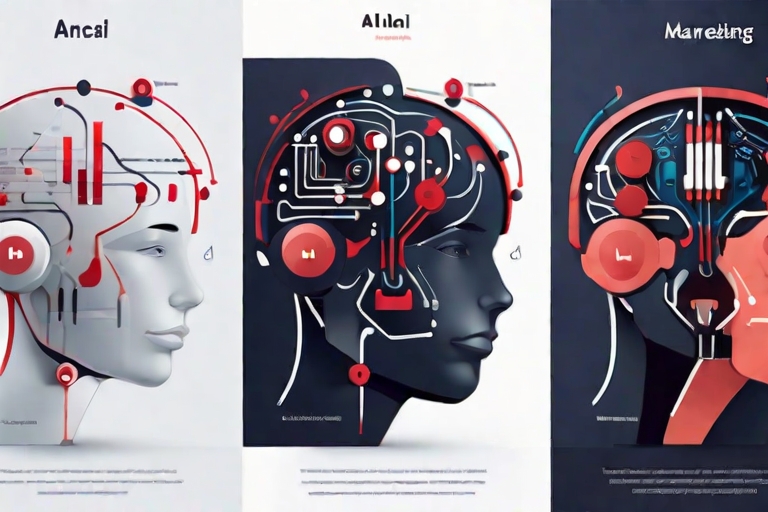With each passing year, artificial intelligence (AI) permeates deeper into various aspects of our lives. The AI’s impact has led to unprecedented advancements and transformations across multiple industries
AI’s ability to analyze vast amounts of data, learn from patterns, and make autonomous decisions has caught the attention of diverse industries.
This groundbreaking technology has transcended its early roots and is now deeply embedded in various sectors. They are reshaping the way we conduct business, interact with customers, and even create art.
From the precision of finance to the artistry of music, AI’s impact spans far and wide. Again they are revolutionizing processes, enhancing decision-making, and unlocking new potentials across board.
In this exploration, we embark on a journey through three areas where AI’s impact is particularly pronounced: Finance, Marketing, and Music.
Each sector bears witness to a unique way of AI-driven innovations, showcasing the adaptability and versatility of this technology.
As we delve into these industries, we’ll uncover how AI is not just a tool but a transformative force. AI is driving efficiency, personalization, and creativity. From optimizing financial strategies to revolutionizing customer engagement. Also, refining marketing campaigns to push the boundaries of musical composition, AI’s impact is felt across the spectrum.
Join us as we unravel the narrative of AI’s expanding role across industries. We will discover the remarkable ways in which it is reshaping the world of business, creativity, and customer experience. Together, we’ll look at the transformative AI’s impact in finance, marketing, and music. This helps us gain insights into a future where innovation knows no bounds.

Chapter 2: AI’s Impact on Finance
AI has quickly revolutionized the field of financial analysis, enabling analysts and investors to make informed decisions with greater accuracy and efficiency.
By employing machine learning algorithms, AI systems can analyze complex financial data, identify patterns, and predict market trends. This data-driven approach helps investors to make informed decisions, minimizing risks, and maximizing returns.
Moreover, AI-powered systems can scan through enormous datasets in real time. By doing so it’s able to catch minute fluctuations in stock prices, interest rates, and other financial indicators, often missed by human analysts.
In finance, Artificial Intelligence (AI) has emerged as a formidable ally. Its integration has not only streamlined operations but has also fundamentally altered how financial institutions operate and serve their customers.
Transforming Financial Analysis with AI
Gone are the days of laborious manual data crunching. AI-powered algorithms have ushered in a new era of financial analysis. These algorithms possess the extraordinary capacity to process vast amounts of data at speeds that exceed human capability.
This breakthrough enables financial professionals to make quicker and more accurate assessments of market trends, risk factors, and investment opportunities.
Key Developments:
Algorithmic Trading: AI-driven trading algorithms have revolutionized market dynamics. These algorithms make split-second decisions based on real-time market data, effectively reducing human error and enhancing trading efficiency.
Predictive Analytics: AI models are now capable of forecasting market movements. By analyzing historical data, news sentiment, and other variables, they generate predictions that empower investors to make more informed decisions.
Risk Management: AI algorithms play a pivotal role in assessing risk factors associated with various financial instruments. They excel in evaluating credit risk in lending, identifying potential market risks, and optimizing investment portfolios for risk-adjusted returns.
Quantitative Analysis: AI’s ability to process quantitative data at an unprecedented scale has unlocked new frontiers in financial modelling and analysis. This is particularly invaluable for complex financial instruments and derivatives.
Enhancing Fraud Detection and Prevention
As technology advances, so do the techniques employed by fraudulent actors. AI has emerged as a potent tool in combating financial fraud by significantly bolstering detection and prevention mechanisms.
AI algorithms can analyze vast amounts of transactional data, identify suspicious patterns, and promptly detect potential fraud attempts. By leveraging AI’s ability to continuously learn from new data, financial institutions can stay one step ahead of fraudsters and protect their customers’ hard-earned money.
Noteworthy Advancements:
Behavioural Analysis: AI systems conduct in-depth analyses of user behaviour, establishing a baseline and subsequently detecting deviations that may signal fraud. This includes identifying unusual spending patterns, atypical transaction times, and irregular locations.
Pattern Recognition: Machine learning models excel in recognizing patterns associated with known types of fraud, while also adapting to detect new, previously unseen patterns.
Real-Time Monitoring: The introduction of AI allows for continuous transaction monitoring, enabling immediate response to suspicious activities. This significantly reduces the window of opportunity for fraudsters.
Revolutionizing Customer Service in Finance
Traditionally, customer service in the finance industry has been associated with long wait times, repetitive processes, and impersonal interactions. AI is reshaping this landscape by revolutionizing customer service experiences.
AI-powered chatbots can provide immediate assistance and guidance to customers, making interactions faster and more personalized. Natural Language Processing (NLP) enables these chatbots to understand and respond to customer queries in a human-like manner, providing a seamless customer experience.
Moreover, AI’s ability to analyze massive amounts of customer data helps financial institutions gain valuable insights into customer preferences, enabling them to tailor their services and products to individual needs.
Notable Features:
24/7 Availability: AI-powered customer service operates around the clock, ensuring customers have access to immediate assistance whenever they need it.
Personalized Recommendations: Through sophisticated data analysis, AI offers tailored financial advice, investment suggestions, and product recommendations based on individual customer profiles.
Natural Language Processing (NLP): AI systems understand and respond to natural language queries, making interactions with customers seamless and intuitive.
Efficient Issue Resolution: By leveraging AI, financial institutions can resolve customer issues more efficiently, reducing wait times and improving overall satisfaction.
In conclusion, AI has permeated various facets of the finance industry, from revolutionizing financial analysis to bolstering fraud prevention and enhancing customer service.
These advancements not only streamline operations but also empower financial professionals to make more informed decisions. As technology continues to evolve, the finance sector is poised for further transformation and innovation.
Chapter 3: AI’s Influence on Marketing
In the dynamic world of marketing, staying ahead of the curve is essential. Enter Artificial Intelligence (AI), the game-changer that has redefined the way businesses connect with their audience.
Through its integration, marketing has transcended traditional boundaries, unlocking unprecedented levels of personalization, automation, and data-driven precision.
Personalization and Customer Insights
AI has bestowed marketers with the power of personalization on a scale previously unimaginable. By analyzing vast troves of customer data, AI algorithms generate insights that enable businesses to tailor their messaging, products, and services to individual preferences.
Key Advancements:
Behavioural Analysis: AI delves into customer behaviour, identifying patterns and preferences that guide personalized marketing strategies.
Predictive Recommendations: By analyzing past interactions, AI can predict future preferences, enabling businesses to offer timely and relevant suggestions.
Segmentation and Targeting: AI aids in segmenting audiences based on various parameters, ensuring that marketing efforts are directed towards the most receptive demographics.
Intelligent Automation in Marketing Campaigns
Gone are the days of manual execution and monitoring of marketing campaigns. AI brings intelligent automation, allowing marketers to streamline various aspects of their campaigns.
AI-powered tools can automatically optimize ad placements, perform A/B testing, and dynamically adjust campaign parameters based on real-time data. By reducing manual intervention, AI allows marketers to focus on creativity and strategy, resulting in more effective and impactful campaigns.
Noteworthy Features:
Email Campaign Optimization: AI fine-tunes email content, subject lines, and send times to maximize open rates and engagement.
Dynamic Content Generation: AI generates personalized content in real time, ensuring that each customer interaction is relevant and compelling.
Social Media Management: AI tools schedule posts, analyze performance, and even engage with customers, ensuring a consistent and impactful social media presence.
AI’s impact on Data-Driven Decision Making
Data is the new currency in the marketing world, and AI serves as the catalyst for unlocking its true potential. AI-powered data analytics tools can process enormous volumes of data, generating actionable insights and paving the way for data-driven decision-making.
By leveraging AI, marketers can gain a comprehensive understanding of customer behaviour, market trends, and campaign performance, enabling them to make data-backed decisions that drive business growth.
Notable Capabilities:
Predictive Analytics: AI models forecast future trends and customer behaviours, allowing marketers to proactively adapt their strategies.
Customer Journey Mapping: AI traces the customer journey, illuminating touchpoints and opportunities for engagement and conversion.
ROI Optimization: AI helps allocate resources efficiently, ensuring that marketing efforts yield the highest possible return on investment.
In conclusion, AI has revolutionized marketing, empowering businesses to connect with their clients on a personal level. In addition, they are able to automate campaigns with finesse, and make data-driven decisions with confidence.
Moreso, as this technology continues to evolve, the marketing landscape is poised for even greater innovation, and those who harness the power of AI will undoubtedly lead the way into the future of marketing excellence.
Chapter 4: The Fusion of AI and Music

In the creative and artistic industry, Artificial Intelligence (AI) has emerged as an unexpected yet profoundly influential collaborator. Through its integration into the world of music, AI is pushing boundaries, redefining composition, discovery, and production in once unimaginable ways.
Discovering new music has become effortless with AI-powered recommendation systems. By analyzing listening patterns, preferences, and similarities between users, AI algorithms can suggest personalized playlists and recommend songs that align with individual tastes.
These recommendation systems have transformed the way music enthusiasts discover diverse genres and unearth hidden gems, creating a more enriching and personalized musical experience.
AI in Music Creation and Composition
AI’s impact extends beyond music composition and into the production and mixing stages. AI-powered tools can automatically adjust audio levels, optimize sound quality, and even suggest different arrangements to enhance the overall listening experience.
Additionally, AI can analyze existing music tracks to extract and isolate vocals or instrumentals, facilitating remixing and mash-up creations. These advancements in AI technology empower musicians and producers to experiment with new sounds and innovate in ways previously unimaginable.
AI has transcended from being a mere tool to an active contributor to the creative process of music composition. By analyzing vast libraries of musical data, AI algorithms generate original compositions that challenge conventional notions of authorship.
Key Innovations:
Style Mimicry: AI can emulate the style of various composers or genres, producing compositions that mirror specific musical identities.
Collaborative Composing: AI tools can assist musicians by generating melodies, harmonies, and even entire sections of a composition, providing a springboard for further creativity.
Genre Blending: AI breaks down barriers between musical genres, creating compositions that seamlessly integrate elements from diverse musical traditions.
Improved Music Recommendations and Discovery
In the age of streaming, music recommendations play a pivotal role in shaping our musical journeys. AI-driven recommendation engines have revolutionized how we discover and engage with music, helping us uncover hidden gems and new favourites.
Noteworthy Advancements:
Personalized Playlists: AI tailors playlists to individual preferences, ensuring that listeners are exposed to music that resonates with their unique tastes.
Discovery Algorithms: AI algorithms analyze listening patterns and user behaviour to suggest tracks that align with a listener’s existing preferences while introducing them to new and exciting artists.
Contextual Recommendations: AI takes into account various factors, including mood, location, and activity, to curate playlists and recommendations that suit the moment.
AI in Music Production and Mixing
In the studio, AI is emerging as a powerful partner in the production and mixing process. By leveraging machine learning algorithms, producers can achieve a level of precision and creativity that was previously unattainable.
Notable Features:
Automated Mixing: AI tools can optimize the levels, EQ, and effects of individual tracks. This helps streamlining the mixing process and achieving a polished sound.
Noise Reduction and Enhancement: AI algorithms can identify and eliminate unwanted noise, as well as enhance the quality of audio recordings.
Real-Time Feedback: AI offers instant feedback on production decisions, allowing producers to make adjustments on the fly for a seamless workflow.
In conclusion, the fusion of AI and music represents a remarkable convergence of technology and creativity. From generating original compositions to revolutionizing how we discover and engage with music, and from enhancing the production process to pushing the boundaries of mixing, AI is leaving an indelible mark on the world of music. As this collaboration continues to evolve, the possibilities for musical expression and innovation are boundless.
Conclusion: A Glimpse into AI’s Future and Call to Embrace Innovation
As we have explored in this blog post, AI’s impact has permeated across diverse industries. It has become clear that Artificial Intelligence (AI) is not merely a technological advancement. It is a paradigm shift that has fundamentally altered the way we conduct business, create, and connect with our audience.
Looking ahead, the trajectory of AI promises even greater transformation. In finance, we can anticipate even more sophisticated algorithms, capable of navigating complex market dynamics with unprecedented precision.
The realm of marketing will see AI evolving to understand and cater to individual preferences on an even deeper level, revolutionizing customer engagement. In the world of music, the fusion with AI will likely give rise to entirely new genres and styles, challenging the very definition of what constitutes music.
However, for this future to become a reality, it requires more than just technological advancement. It necessitates a collective commitment to embrace innovation. There is the need for a willingness to challenge conventions, explore the uncharted, and embrace the potential of AI as a tool for progress.
It is incumbent upon us, as individuals and as industries, to foster an environment where creativity, technology, and innovation converge. By doing so, we not only unlock the full potential of AI but also pave the way for a future where the boundaries of what is possible are continually pushed.
In conclusion, as we stand at the threshold of a future shaped by AI, let embrace it with curiosity, courage, and a steadfast commitment to innovation. Together, we will not only navigate the transformative waves of AI but also chart new territories of possibility, redefining the way we approach finance, marketing, music, and beyond.



